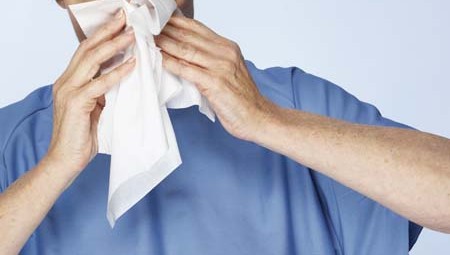The best plan for dealing with allergic rhinitis in the long run is, of course, to avoid the things in your life that cause it. But that isn’t always possible. The next best plan is to do what you can to protect yourself from allergy as much as possible. Here are some tips to try:
- Supplement with C. New evidence says that taking vitamin C on a long-term basis can lower the amount of histamine in your blood. Remember, histamine is the chemical that causes an allergic response in your eyes and nose, so if you have less in your body, you’ll have fewer symptoms. Since vitamin C acts as a natural antihistamine, you may be able to cut down on the drugs you take for your allergy. A supplement of 500 mg a day should be plenty to give you the full benefits of vitamin C. But you should also aim to get most of your vitamin C from food, where it’s combined with other natural compounds to make it work even better.

- Eat for your allergies. In addition to eating fresh fruits and vegetables chock full of vitamin C, here are more allergy-fighting foods to enjoy.
- Dark green and sweet peppers contain vitamin B6, an excellent allergy fighter.
- Asparagus, spinach, nuts, and seeds contain vitamin E, another natural antihistamine.
- Yogurt and other cultured milk products lower the allergens in your digestive tract.
- Green tea makes vitamin C work better and strengthens your immune system.
- Exercise the right way. Certain sports are better than others for keeping your allergies at bay. Outdoor sports such as hiking, running, horseback riding, and in-line skating are more likely to put you on the road to an allergy attack. Swimming, weight training, indoor aerobics, and bowling are good choices for healthy, allergy-free exercise.
- Avoid the obvious. If you know your Aunt Sara’s smoking really bothers your sinuses, don’t visit her when your allergies are acting up. Stay away from spray paint, insect sprays, and magic markers with toxic fumes. Instead, choose latex paint in a can, insect strips or roach motels, and water-color markers that won’t make your allergies worse. Avoid the irritating fumes of dry cleaning by wearing more washable clothes. When clothes come home from the cleaners, hang them outside or in a ventilated garage for a few hours to let the fumes evaporate.
- Stamp out interior allergens. Vacuum your house twice a week to remove dust and dust mites, pollen, and animal dander. You may want to get some of the new super-filtering vacuum bags that are available. Dust regularly in the out-of the-way spots you might forget, such as under the refrigerator, behind the sofa, and on the blades of the ceiling fan. Check your kitchen, bath, and basement for damp places where mold, another powerful allergen, can grow. Wipe it out with a solution of bleach and water. Limit your indoor garden to just a few plants. The wet soil of houseplants can grow a bumper crop of mold.
- Garden wisely. If you’re a gardener, make your yard and garden beautiful with plenty of non-allergy-causing plants. Usually, plants with bright flowers don’t cause problems for allergy sufferers, so they’re a good choice for landscaping. The culprits are most often weeds, grass, and trees. Trees that are likely to cause a pollen problem are ash, birch, cottonwood, elm, oak, olive, pecan, poplar, walnut, and willow. Better choices for people with allergies are dogwood, fig, fir, magnolia, palm, pear, pine, plum, and tulip trees. The shrubs to avoid if you have allergies are elderberry, juniper, and privet. Allergy-free choices for your outdoor space include boxwood, nandina, pyracantha, verbena, viburnum, and yucca.
Being able to see the world around you is a precious gift. Take good care of your eyes by looking out for illness or injury that could rob you of your sight. If your eye problems are limited to allergies, try our self-care tips to keep yourself comfortable and better able to see eye-to-eye with the world.